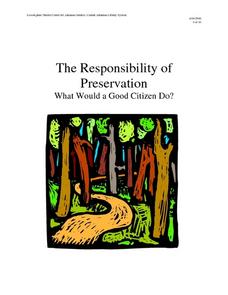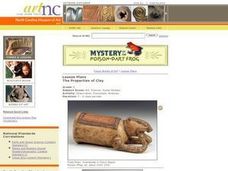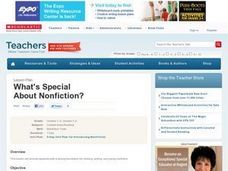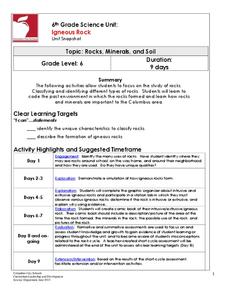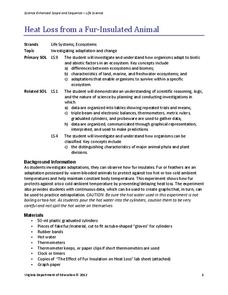Curated OER
Scientific Method Problem Adjectives Worksheet
In this adjectives activity, students write 6 adjectives around a large question mark in the center of a graphic organizer. Students describe the scientific method with adjectives. Students write a sentence for four of their words.
Curated OER
N is for Natural State
For any pupils who live in the state of Arkansas, this would be a fabulous educational experience to help them get to know their state better. Through the use of activities in literature, art, mathematics, science, social studies, and...
Curated OER
Where Has It Been? Tracking the Ivory-Billed Woodpecker
By studying the assumed extinction, and subsequent rediscovery of the Ivory-billed Woodpecker, learners use maps and come up with a scenario for the rediscovery of the bird. This incredibly thorough lesson plan is chock-full of...
Curated OER
The Responsibility of Preservation
Upper elementary and middle schoolers study the case of the ivory-billed woodpecker, a bird that was once-thought to be extinct. Learners explore the responsibility of people to preserve habitats, and take care of the animals who live in...
Columbus City Schools
Cell-abrate!
Lights, camera, action! With the cell at center stage, guide your seventh grade biologists through the tiny drama that plays out within every living thing. Then, enjoy the show as they portray the organelles they've studied—a performance...
Science 4 Inquiry
Journey Through the Spheres of the Earth
Each of the Earth's spheres interacts with the other spheres in predictable ways. Young scientists explore these interactions through a hands-on activity, graphing, and watching a video. They summarize their knowledge in a video or...
Curated OER
The Properties of Clay
Sixth graders determine the physical properties of clay by examining ceramic works of art. They evaluate local soil samples for suitability for sculpting and compare clay taken from soil to manufactured clay.
Curated OER
What's Special About Nonfiction?
Students examine the difference between nonfiction and fictional writing. They identify the characteristics of nonfiction literature and examine how a nonfiction textbook organizes information.
Curated OER
What Is Natural?
Your junior highers will learn about which objects are natural and classify objects as abiotic or biotic. Your class will trace human products to their natural resources using matter cycles and then create their own definition of nature.
Curated OER
Neither Wind Nor Rain
Here is another in the interesting series of lessons that use the special State Quarters as a learning tool. This one uses the North Dakota State Quarter. During this instructional activity, your class learns about the different patterns...
Random House
Focus On: Censorship & Banned Books
Billy Collins' "Rain" introduces the Random House 104-page magazine for educators that focuses on censorship and banned books. The resource is packed with teaching guides, articles by noted authors, and links to organizations against...
Columbus City Schools
Igneous Rock
These rocks are HOT! Well, they used to be, anyway. Take young geologists on a two-week journey through the life and times of the average igneous rock. Lab groups work together to hypothesize about intrusive and extrusive igneous rock...
Science 4 Inquiry
It's Not All Visible
Electromagnetic waves travel though empty space, something no other wave type can accomplish. Young scientists learn more about the entire spectrum of electromagnetic waves. They sort cards and apply their knowledge to create models of...
Curated OER
Digging Up Facts About Dinosaurs
Second graders conduct research on a given dinosaur using various resources, complete an information sheet that be used to create their graphic organizer from, and produce a graphic organizer, using the Kidspiration software.
Virginia Department of Education
Heat Loss from a Fur-Insulated Animal
How do animals adapt to weather changes? Provide your class with the ability to understand adaptations and body temperature as they participate in this hands on experiment, using fake fur and hot water. Pupils collect data and analyze...
Curated OER
Digging Up Facts
Pupils research a historical legend. They participate in a discussion of the legend of Kissing Kate Barlow in the novel Holes. Students then chose one of three American legends and use internet research to complete a provided graphic...
Channel Islands Film
Island Rotation: Lesson Plan 4
Foster's Rule? Allopatric speciation? After watching West of the West's documentary Island Rotation, class members use Venn diagrams to compare endemic species on the Channel Islands with mainland related species. They then create a...
Curated OER
The Gulf Coast Region: Georgraphy, Demographics and the Effects of Hurricane Katrina
Students research Hurricane Katrina and create a Cause and Effect graphic organizer or a Chain of Events graphic organizer.
Curated OER
Let's Go Fly a Kite!
Students research and report on aspects of kites. They research the history of kites, the types, and building and flying kites. They use software that enables them to create a graphic organizer and then they create booklets with word...
Curated OER
Louisiana Cinquains
Students enhance their understanding of parts of speech by writing a cinquain poem about Louisiana. In this cinquain poem lesson, students read example cinquain poems and study the format for a cinquain poem. Students create a class poem...
Curated OER
Our Dinopals with WordArt
Elementary schoolers use the writing process steps to write a descriptive paragraph about a fictional dinosaur. Using a tech tool lesson, they create a graphic title for the paragraph. A nice blending of technology with "old-fashioned"...
Museum of Tolerance
Disenfranchised People of the New Nation
Why are some immigrant groups in the United States embraced while others become disenfranchised? To answer this question, teams investigate why groups emigrated to the US, why some of these these peoples were disenfranchised, and their...
Teach Engineering
Cell Membrane Structure and Function
Teach your class how to get out of a cell — or break in. The third installment in a seven-part series introduces the class to cell membranes and their functions. The lesson plan includes information to present to the class,...
Teach Engineering
Cell Celebration!
Are you eukaryotic? (Answer: Yes.) The first of six installments in the Cells units teaches pupils about the similarities and differences of prokaryotes and eukaryotes. It also covers the functions of various cell components in both...





